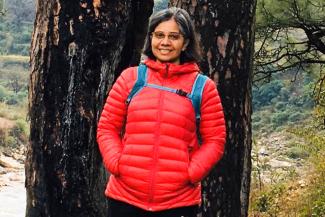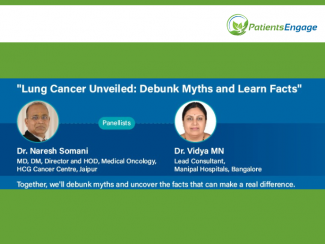
Yashoda Wakankar, who got freedom from epileptic seizures after 23 years post-neurosurgery, has been successfully running a support group and marriage bureau for persons who have epilepsy for over a decade.
I have been living with epilepsy since childhood. I was 7 years old when I got my first epileptic attack. I was unconscious for the whole day. Later, I was diagnosed suffering from left Temporal Lobe Epilepsy. At first I used to have 2–3 attacks a month, but day by day the attacks increased, going up to 5-10 a month.
हिंदी में पढ़ें: मैं अब पूरी तरह से सीज़र से मुक्त हूँ
Supportive Parents
Every moment was an anxious moment for me. I didn’t know when an attack would knock me out. Besides, I had to live a life full of restrictions. No swimming, no driving, no running. But both my parents have very positive and supportive from the beginning. They never treated me differently or as a child with some illness. They brought up my sister and me in the same manner, but due to this illness I could not participate in any of the sports and outdoor activities. So my parents encouraged me to cultivate hobbies, which I could do at home. They started me on Indian classical music class, drawing and many other hobbies. For me, classical music turned out to be my meditation, which is still continuing. At first, drawing was a hobby, but eventually it became my profession. I became Commercial Artist.
My mother, Dr. Anita Awachat, was my mentor from my childhood. She was a perfectionist. She taught me how to take medicines on time, how to keep notes about the attacks, etc. Her opinion was that ‘tablets are our friends’ and we have to accept them happily, and we have to say while taking medicines that ‘I will be all right because of these medicines!’ She taught me how to accept my illness and how to live positively with epilepsy. Epilepsy is not only a physical disease, it also depends on your mental strength as well. It is said to be a psychosomatic as well. Meditation helped me counter the disease from time to time.
My mother was affected by cancer in 1989. But she was not at all nervous or depressed. She was working hard till her last day before she got admitted even if she was a cancer patient. She was my inspiration, especially the way she handled her illness.
My husband Parag
Parag, my husband, also thinks very positively, just like my parents. I got married when I had epilepsy. It was a love marriage; however, many people get surprised how I got married when I had epilepsy! I believe that your personality and your perspective towards epilepsy helps you to present yourself in society. And that helped me a lot! Parag stood staunchly by my side and emboldened me to face epilepsy, and go beyond the disease. After our marriage he started to know and learn about epilepsy. He started to read, surf the net and give me information about epilepsy. He would also join me in doing Vipassana. However, my attacks were increasing day by day. Then one day my neurologist, Dr. Pradeep Diwate told us about the possible surgery for epilepsy.
At the time, we were unable to follow up on the doctor’s advice because we had to suddenly move to Belgium on account of my husband’s job. During that one-and-a-half year stay, my attacks became very erratic and finally the most dreaded thing happened. I got an attack while I was cooking and I got third degree burns on my hand. That is when we decided to finally take a chance at epilepsy surgery. We came to India, took an appointment at Sree Chitra Tirunal Institute, Trivandrum. After a video EEG, initial check-ups and diagnosis of one week stay at Sree Chitra, Dr Radhakrishnan told us that I was a good feasible candidate for surgery. This gave us a ray of hope. It was a very important and critical decision and we had nothing to lose.
Free from seizures post-surgery
I was operated on 2nd July, 2003 (my surgery was 495th epileptic surgery at Sree Chitra!). The operation lasted for about 8 hours. After a long wait, doctors told Parag that operation was successful, but the anxiety didn’t go right away, because my family and I had lived with epilepsy for 23 years. All the doctors and nurses at Sree Chitra are very dedicated and caring team. After operation I kept myself occupied with origami, and reading to ignore the pain. My recovery was very fast, and I was discharged after 7 days. The first review at Sree Chitra after 3 months showed no signs of epileptic activity in my brain. This was sheer joy to us, and simply too hard to believe.
However, I still consider myself as “person with epilepsy”, even if my epileptic seizures are controlled for last 16 years. It is true that our past never leaves us, and we have to look at our disorder or illness very positively. Epilepsy has taught me a lot. Epilepsy has taught me to live positively. Whenever I used to get the seizures, I used to say that the remaining days in the month are mine. And I used to tell my family members that I will try to live the best on those remaining days. And I did it!
I am absolutely seizure free. I am a fit and fine woman. I cycle for minimum 10 kilometres every day, or sometime I run for 10 kilometres. I go for the treks in the Himalayas. I do all the households like a normal woman. I do Vipassana meditation, which helps me keep myself peaceful.
Now I want to share my joy. I always wanted to reach out to people (this I possibly inherited from my parents), and hence decided that whatever the disease and a successful surgery has taught me and the manner in which I seem to have conquered it, should be passed on to as many epileptic patients as possible.
This has given rise to an idea of forming a support group for epileptic patients and their families. I started to meet epileptic patients and their families and many neurologists in Pune. I told them about my operation and shared the idea of support group with them etc. I learnt about a very active epilepsy support group, “Samman” in Mumbai. I started to attend the support group in Mumbai. When I saw confidence in epilepsy patients, I felt very glad! Yet there is a need to bring about more awareness in the society. A person with epilepsy can lead a normal life, live happily while fighting with the disease.
Now days we see a lot of awareness about all the disorders. However, I am talking about the era, which was 40 years back! (Unfortunately, even today we have so many misunderstandings about epilepsy) Those days there was no internet. There were not the events and support groups. And people were not aware of the word “epilepsy”! In Indian local language it was called as “fit, akadi, chakkar or apasmar”. But all the people were not aware of that too. No one used to talk openly about epilepsy. In that scenario, my parents raised me up like a normal child. They talked openly about my epilepsy. They encouraged me to do all the things that normal child should do. They helped me not lose my confidence. It helped me cope with the situations, whenever I used to get an epileptic attack. My perspective towards epilepsy became very positive because of my parents.
Starting a support group
In 2004, soon after my surgery, I started an NGO Sanvedana Foundation epilepsy support group, to reach out to those who needed help. I was lucky to have supportive parents, but in India, they are so many people still unaware about the reality about epilepsy. Talking from own experience, I feel human psychology and home environment is so important while you deal with any disease or disorder. I found so many misunderstandings and misconceptions about epilepsy in the society, and hence, Sanvedana Foundation was born.
From the beginning, so many parents have joined Sanvedana Foundation, as volunteers. And that is the strength of our NGO. We have monthly epilepsy support group meetings, and every Wednesday we have counselling sessions. Subsequently, we expanded and increased some special activities, such as, epilepsy marriage bureau, and providing medicines to needy epilepsy patients.
I have been frequently asked as to what led me to start Sanvedana Foundation marriage bureau. Well, while running epilepsy counselling centre, we had many patients with controlled epilepsy pose question about marriage and relationships. Parents were often in a dilemma if they should disclose their son’s or daughter’s epilepsy, while arranging the marriage! We also saw more than 50 cases, whose marriages were broken since they have tried to hide their epilepsies before marriage! We saw that so many normal people with controlled epilepsy, remain unmarried because of their epilepsy history! And hence, Sanvedana Foundation’s epilepsy marriage bureau got started in 2008.
To get a better understanding of marriage and epilepsy, I have participated in two national level researches and one in done in South Asian Countries. The fourth research I have done alone, at the state level. We have tried to organise extensive awareness programs about how people with epilepsy have rights to get married.
I am proud to inform that till date we have arranged 6 epilepsy matrimonial meets in Pune, and arranged 29 marriages. We get responses from all over India.
An important activity is undertaken by Sanvedana Foundation is, “Medicine help for the needy people with epilepsy.” Medicines for epilepsy need to be taken for long periods, sometimes a lifetime. We found that many low-income patients cannot afford medicines for epilepsy. Either they do not start medications, or they discontinue the medications. To bridging this treatment gap, we started to help the needy people for their epilepsy medications. We appeal for the donations, and we were lucky to get some donation from a company’s CSR funds. Currently we are helping 125 people every month! We not only help them for their epilepsy medicines, but also for the tests like MRI, EEG etc. We really feel good to see the happiness on the faces of the parents, when their child starts feeling better because of this help with medicines.
This is the journey of Sanvedana Foundation for last 15 years. And this is also my journey from childhood. Sanvedana’s work is teaching me a lot! As I said earlier, I was lucky to have very good parents, very good treatment from the beginning; however while working in the society, I learnt the reality in India. I realised how some people are still “suffering”, instead of “living with epilepsy”. I learnt that we still need a huge awareness in India!





